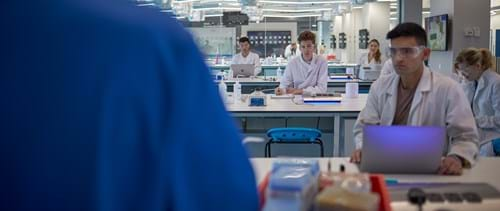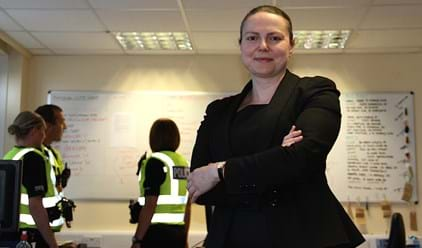Pause carousel
Play carousel
Psychology is about understanding brains and behaviour. It seeks to generate, test, and evaluate the best explanations that we currently have, for how and why the mind works in the way it does.
Find out how people think, and develop your scientific understanding of human behaviour on one of our flexible undergraduate psychology degrees.
We train you to develop your knowledge and understanding of human behaviour, so you can then apply it to real-world situations, and transfer your skillset to a variety of careers in research, science, and business.
All our degrees are accredited by the British Psychological Society which means you are eligible to become a graduate member. This is an essential first step to becoming a Chartered Psychologist, which means you can apply for applied roles in health, education, clinical, counselling and more.
On our last accreditation visit we were commended on our vibrant academic community, approachable staff, and the opportunity for students to take a variety of assessment types and receive quality feedback on their work.
We are one of the top institutions for Psychology in the UK:
We are also in the UK Top 10 for Research Quality among modern universities that teach psychology (UoA4 REF 2021).
This means you'll be taught by dedicated staff, many of whom are producing world-leading research (UoA4 REF2021), so you can immerse yourself in cutting-edge research that improves our understanding of the mechanics of individual and group behaviour.
We offer many opportunities for students to engage in research, and many of our best graduates have successfully attracted funded research opportunities as a postgraduate.
We'll help you to develop skills in the analysis and interpretation of evidence left behind at the crime scene and presented in the courtroom. You'll work in specialised crime scene simulations, a microscopy suite and a range of analytical laboratories.
Accredited by the Chartered Society of Forensic Sciences, you'll get real world experience through laboratory projects and unique field visits. This includes mortuary and bomb disposal sites, lead by industry professionals such as former senior police officers who have extensive experience of CSI (from disaster victim identification to firearms crime).
You'll learn in an authentic environment for criminal/civil investigations and complete your learning in a final-year mock courtroom assessment.
All of which makes Abertay one of the best places in the UK to study Forensics according to the 2022 Complete University Guide.
Our colleagues co-deliver an MSc in Applied Artificial Intelligence and User Experience. This is an increasingly popular route to employment for graduates interested in human-computer interactions.
Please see 'Our Research' below for the areas of research focus in this Division.
If you are interested in postgraduate study in Psychology or Forensic Science, please review our areas of expertise below where we are happy to supervise postgraduate students.
Or visit our staff research profiles for more information on recent projects.
If you are looking for something more specific, check the full list of university-wide research opportunities here.
We have access to twelve dedicated staff research labs and a suite of experimental cubicles, specialised crime scene simulation areas, and a dedicated VR laboratory with Oculus Quest 2 for immersive experiments.
We have a microscopy suite and a range of analytical laboratories for analysing physiology and biochemistry, including an Atomic Force Microscope and Vacuum Metal Deposition machine.

Our research hardware includes an anechoic chamber, wall mounted remote controlled CCTV cameras, EEG with Paradigm, tCDS machine, SMI Eye View X HED Mobile Eye-Tracker and BeGaze analysis software, SR Research Eye Link II Eye Movement Recorder, equipment to measure galvanic skin response, BioHarness Telemetry System with LabChart, CUDA modelling PC, two Pupil Invisible mobile eye movement recorders, Fujitsu CRT and Sony Trinitron monitors, and a photography suite with image processing software, thermal imager, and 3D camera. Our labs are equipped with high-end PCs with appropriate licensed software (e.g., E-Prime, FaceReader, Genemapper, Gorilla, N-Vivo, Observer XT, Psychopy, Qualtrics, SPSS, Superlab) and our test library includes standardized tests of aptitude and IQ, executive function, mental health, and vision.
We also have access to the Emergent Technology Centre, a biomechanics and movement facility for high-quality video-capture and full kinematic analysis, a portable fEMG machine, and private interview rooms with recording equipment for qualitative research and training in counselling and interviewing skills. We have ongoing external partnerships for primate observation at zoos, and research links with charitable organisations including those in coaching and the performing arts.
Our research aligns with the strategic themes of the university and many UN Sustainable Development Goals including:
Peace, Justice, and Strong Institutions.
Good Health and Wellbeing.
Quality Education.
We have strong research links with many local, national, and international organizations, collaborating with academics and stakeholders from over 15 countries across five continents.
Our division has three major research areas, with staff often working across those areas. Our research has attracted funding from ESRC, BBSRC, AHRC, Leverhulme Trust, EU Horizon 2020, Ministry of Defence, and the Scottish Government, with our outputs generating hundreds of news articles from major outlets.

This area examines topics such as the impact of intoxication on eyewitness testimony, best-practice techniques for interviewing eyewitnesses, and the variety of circumstances and outcomes involved in missing persons investigations.
Our Forensic staff examine the challenges involved in recovering evidence from complex surfaces such as fingerprints/marks on fabrics, banknotes, and feathers (wildlife crime). They work with police forces and the Home Office and contribute to research-informed best practice for government and policing, such as using less harmful formulations to detect finger-marks in faster time. Research from this group has been commended for its impact in wider society (ESRC Award for Outstanding Impact in Society; REF2021 UoA12 impact rated 100% internationally excellent/world-leading).
Researchers in this area explore topics such as the role of colouration in nature and real-world contexts in both camouflage and warning signals.
Our researchers are interested in how diverse user groups (e.g., older persons, people with disabilities) allocate attention when interacting with complex visual arrays, how we experience dance at the neural level and the impact of dance on the wellbeing of both the audience and participant, particularly when the latter have specific needs (e.g., among people with Parkinson’s disease).
Some of our staff in this group are also interested in the evolutionary basis of social cognition and the impact of social cognition on various social and personal relationships.

Researchers in this area are interested in the role played by our sense of self in attention and memory, and whether we can harness self-biases to improve academic learning.
Staff are interested in how these biases develop both in neurotypical and neurodivergent children such as those with ASD or ADHD.
Other topics include the development of social problem-solving abilities in nonhuman primates and children, and the development of the lexicon, dialect, and speech, and how these factors shape literacy, reading, and social interaction.
For employment opportunities - including Research Fellowships - view the job search section on our website.
For PhD Studentships in any of our Subject areas, check out the Funded Research Projects and Postgraduate Research Funding sections.